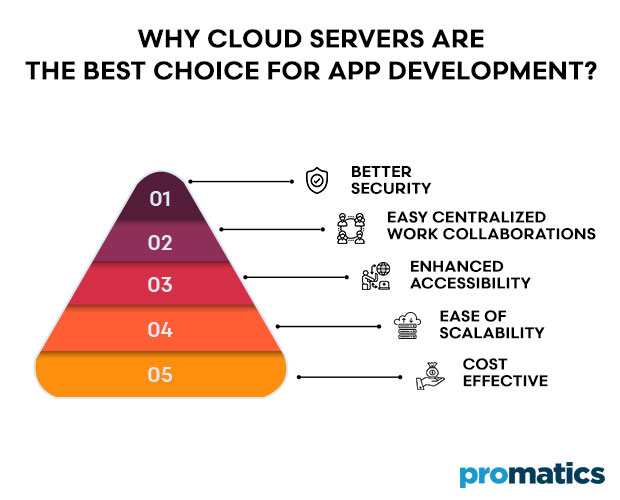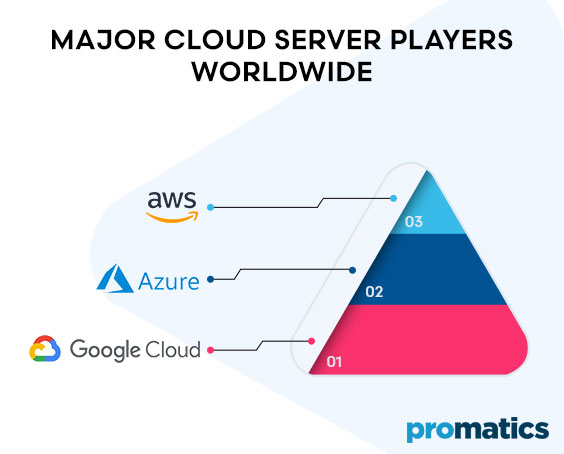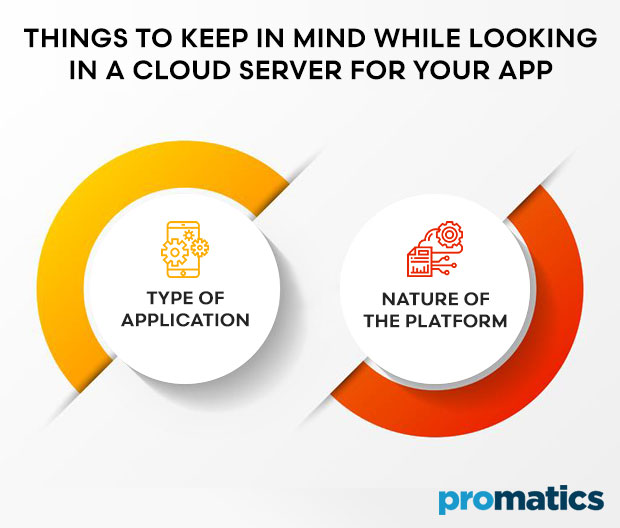How to Choose the Best Cloud Server for your App?
What is a Cloud Server?
Cloud servers are a robust physical or virtual infrastructure that allows application- and information-processing storage. With the use of well-integrated virtualization software, cloud servers a physical (bare metal) server into multiple virtual servers. Cloud server businesses offer an infrastructure-as-a-service (IaaS) model to process their client’s workloads and store information. The infrastructure model can be physical, virtual, or a mix of both as it depends on the use case. They allow their clients to access virtual server functions remotely through an efficient online interface and perform all the capabilities of an on-premises server.
Why Choose Cloud Servers for App Development?
Cloud technology is fast revolutionizing the way entrepreneurs and developers look at successful app development. With the help of modern mobile computing and data analytics, businesses can create apps that bring forth high returns on user’s efforts and investment. Cloud computing innovations are working towards enhancing the features of mobile applications, thus helping businesses grow. All companies are on the lookout for more accessible, efficient, and faster ways of developing apps that can help enterprise requirements and customer choices in productive ways.
The times of using dedicated on-site servers are far gone, and modern businesses are shifting towards a hosted cloud service to improve their workflows, save resources, and stay ahead in the game. If you are still not much convinced about upgrading to a streamlined cloud-based platform for a server, here are the reasons you must take a look at:
a.) Better Security
Data security is a pressing need and a primary concern of most IT businesses of late. Using cloud servers ensures that you get advanced security features like data encryption and routine backups that promise a better level of data security than in-house servers. Leveraging cloud servers for business means regardless of the safety of the hardware; for example, in case of theft or security breach, the data remains safe on the cloud with the use of security features like single-sign On or Two-factor Authentication. It also becomes safer to transfer files between collaborators as it omits the need to email the data back and forth, saving it from the risk of sensitive information being forwarded or downloaded. Cloud servers are touted as reliable resources when compared to traditional servers. If there is any problem with some of the servers, the resources get shifted without affecting the clients.
b.) Easy Centralized Work Collaborations
The data access from a cloud platform becomes centralized, allowing work collaborations with others working on the same project. Cloud servers aid secure communication between colleagues, making them efficient and effective. Regardless of the nature of a company’s client or supplier setup, all collaborators use the same files in the same format, in real-time. Thus, cloud servers can streamline the workflows at an IT business through easy collaborations. Moreover, cloud servers can conveniently integrate into the existing technology toolset that a company uses, transferring data via API or connectors with the option to automate the whole process.
c.) Enhanced Accessibility
Cloud servers allow work collaborators to access their accounts from anywhere, at any time. Moreover, they can use multiple devices and in any location with an internet connection to work on their projects. Cloud servers do not tie down workers to any specific location, giving them the freedom and flexibility they desire. An on-site server certainly lacks such conveniences. Further, dedicated on-site serves require maintenance or upgrades that bring the productivity to a halt. Here too, cloud servers promise zero downtime deployment. They are upgraded automatically while users use the platform allowing uninterrupted and unhampered workflow.
d.) Ease of Scalability
Cloud servers can flawlessly adapt in size according to the increase and decrease in workload at a business. With ups and downs on the company’s growth charts, cloud servers can scale up or scale down accordingly to adapt to the need of the business. Such adaptability is costly and time consuming in terms of a dedicated server. Businesses that sign up for a cloud service can choose the option to pay for their subscription on a month-to-month basis. This allows them to adjust their subscription according to their needs. Businesses thus pay for only the services that they end up using.
e.) Cost-Effective
Long term benefits of using cost servers include their cost-effectiveness for an IT business. With cloud platforms, there is no need to make expensive hardware purchases or time-consuming software installation. This means saving in terms of money and manpower on business infrastructure and its maintenance. Cloud server provider caters to the maintenance needs and helps businesses refocus their attention to essential business needs. Moreover, business clients keep their on-going costs down using the cloud server’s resources when required, and they pay only for what they use.
Major Cloud Server Providers in the Business
Some businesses need a certain degree of on-premise technology. However, most modern enterprise applications are being deployed directly in the cloud. With cloud platforms, app development teams can stay product-focused. They can enjoy the benefits of an existing physical infrastructure that is flawlessly maintained and updated by cloud businesses, helping them dedicate more resources and time to app development projects. Here in this article, we discuss the major cloud server provides for app businesses:
I.) Amazon Web Services (AWS)
AWS boasts of an impressive set of features as a cloud computing platform. It provides easy access to data storage, computing power, and other functionalities necessary for app development. Further, the platform has a host of cloud-based products along with a suite of management tools, developer tools, mobile services, and application services. Mobile app development businesses benefit from the unique application services combined with cloud computing and database infrastructures of AWS.
AWS offers competitive pricing models. The company also provides a free tier for startups and individuals, helping them try before they choose to buy. It offers per-second billing, allowing customers to pay for server uses by the seconds. Depending on the choice of services that a business makes, they can find a reasonable AWS price structure that is lower than the cost of on-premise infrastructure investment.
With its 15 years of enterprise infrastructure experience, AWS continuously works to improve the platform. Amazon allows its customers to access highly durable storage such as Amazon Glacier, Amazon S3, and Amazon EBS. Its high-performance database such as Amazon Redshift, Amazon DynamoDB, Amazon ElastiCache, and Amazon RDS are also of distinct value to app developers.
II.) Microsoft Azure
Microsoft Azure is another major player providing a full suite of cloud computing solutions to meet the needs of app developers. With Azure, developers can deploy and manage virtual machines at scale. It leverages a global network of the Microsoft-managed data center. Developers can process and compute at whatever capacity they need within just minutes with Azure. It is a comprehensive product, and its features integrate with existing systems and processes, enabling better power and ability for enterprise development. Azure is a private as well as a public cloud platform.
With Microsoft Azure, the costs will ultimately depend on which types of cloud products and solutions your development team needs. The hourly fee of the Azure cloud server ranges from $0.099 per hour to $0.149 per hour. For businesses that measure costs by per instance, the prices might seem confusing.
With a full set of features and easily customizable pricing tiers, Microsoft’s Azure cloud platform is one of the most desirable solutions available. Not only does it excel in the speed of deployment, the operation, but also scalability.
III.) Google Cloud Platform (GCP)
Google Cloud Platform offers multiple solutions and products for app developers too. For example, the App Engine allows app developers to build applications without having to deal with the server. It offers a fully managed platform for agile app development. It features a suite of computing, storage, networking, and database products.
The company takes pride in its pay-as-you-go pricing, offering the capacity to bill to the “per second” of usage. It also offers discounts for long-term use, which can lower the cost of new mobile app development projects.
Google offers secure solutions to app businesses dedicated to security protection. Along with data encryption, multiple layers of authentication, and third-party validations, developers can choose an extra layer of security with Google Cloud.
How to Choose a Cloud Server for Your App Business?
A scalable cloud infrastructure can indeed make the launch of an app accessible. Choosing the right kind of cloud platform for app development is a business-critical decision. Because different platforms offer different advantages in terms of cost, functionality, support, and security, narrowing down on the right cloud server infrastructure partner is an important determinant that contributes to the success of app businesses. Here is how you can choose a cloud server for your app business:
a.) Type of Application
The kind of app you are building can help you decide on the cloud servers you must select for your business. You must decide if you want to build a native app, a hybrid one, or a web app. While each type of app has its perks when it comes to user experience, defining a type serves as a primary factor when choosing a cloud server. For example, native apps work on a specific type of operating system and are good picks for games and other consumer-focused businesses with priority on graphics and performance. Web apps, on the other hand, have the flexibility to work on different operating systems. Web apps, thus, do not require high performance or need access to the device’s hardware. Thirdly, hybrid apps are a combination of native and web apps. While they can work on multiple operating systems, hybrid apps can also use the device’s hardware.
b.) Nature of the Platform
The choice of backend platform system is essential to operate and deploy an application. These backend platform systems consist of a web server, operating system, programming logic, and apps’ database. App businesses can choose from LAMP (Linux, Apache, MySQL, and Python), .NET (C#, SQL Server, Windows, and IIS), or MEAN (MongoDB, Express.js, Angular JS, and Node.js.). Sometimes, businesses opt to customize their backend platform to meet their app’s specific requirements.
Hosting an app on the cloud server promises a distinct set of advantages, as discussed above. Businesses can either choose to host their apps on a Public Cloud (Azure, AWS, IBM) or a Private Cloud. With Public Clouds, companies can access a lot of computing power on the Internet, and can even scale quickly. Private Clouds, on the other hand, will enable businesses to control where they store the data; however, they do not bring in any economies of scale.
Do You Need a Content Delivery Network (CDN) for Your App Business As Well?
App businesses often find it challenging to deliver content to an ever-expanding user base in a seamless fashion. They find it challenging to face the issues of performance and scalability. Businesses often use potent tools like content delivery networks (CDN) and cloud computing to face such problems.
Difference Between Content Delivery Networks (CDNs) Cloud Servers
CDN is a network of servers used to deliver content. In CDN, an “origin” server is used to distribute content to other servers throughout various global locations, which are known as “cache” servers. CDN thus increases the speed at which the content is delivered to end-users as well as reduces latency. Most businesses use CDN to deliver large-file content that is often static. CDN serves large media files to local cache servers, which reduces the load on the central or origin server—lowering the likelihood of overload.
Cloud computing on the other hand reduces the cost of delivering content by taking advantage of otherwise unused computer resources. With the help of Server virtualization technology, cloud computing harnesses a single host’s resources (CPU, memory, and storage) and shares them with several virtual machines (VM). Cloud servers offer efficient resource management to reduce the costs of delivering content and applications as well as the easy deployment of server images to an allocated host or cluster of hosts.
In short, a CDN allows app businesses to deliver enormous amounts of content closer to the end-user, but cloud computing provides for quickly scaling resources for applications. When enterprises use CDN and cloud computing together creates a reliable delivery strategy for apps.
Conclusion
Many times app startups finalize infrastructure and layout the initial foundation for the app before they think that it’s time to expand. We work with our clients and aid their collaborations with cloud service providers to build apps with superior user experience. Using cloud servers, we build apps that are multiple platforms compatible, cost-effective, risk-free in terms of security, and frequent crashes.
Our team of app developers is skilled enough to use integrated services to drive business outcomes for app businesses. We specialize in building enterprise-grade apps using cloud technology. We leverage cloud servers into app development strategy to meet the needs of our esteemed clients and enhance the mobile ecosystem for apps. We help our clients build sustainable solutions on cloud platforms and help them maintain them efficiently.
Still doubtful about the brilliance of cloud servers, write to us, and we will help you!
Still have your concerns?
Your concerns are legit, and we know how to deal with them. Hook us up for a discussion, no strings attached, and we will show how we can add value to your operations!


